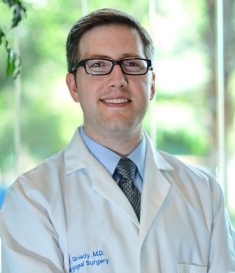Laryngology – Voice and Vocal Cord Disorders

Our voice is one of our most defining characteristics. It allows us to communicate with loved ones near and far. Inflection helps us to express our emotions to others. Many people also rely on their voice for their livelihood. Those who use their voice professionally make up over 30% of the workforce and include singers, actors, teachers, medical professionals, lawyers, and salespeople just to name a few. For most of us, loss of our voice (even for a very short time) can be a devastating event.
Diagnosis and treatment of voice disorders requires several key elements. The first is a physician with interest and expertise in the field of voice. Laryngologists are Ear, Nose, and Throat Surgeons who have spent an additional year of training specifically focusing on the diagnosis and management of disorders of the voice, airway, and throat. The next key element is the ability to closely examine both the structure and the function of the vocal cords. Voice specialists use high definition video endoscopes along with a technique called stroboscopy. This allows the examiner (and the patient) to see the finest details of the vocal cords, as well as their individual vibrations, which are the critical component to sound production.
The final, and perhaps most critical, component is that the patient needs to see a physician to be evaluated. Many patients delay seeking treatment for a variety of reasons. Some just think that losing one’s voice with age is normal or hope that the problem will go away. All too often I see patients who have delayed seeking treatment for years because of fear that they have a cancer in their throat. More often than not, that isn’t the case. But even if it is, catching a cancer at the early stage when it first affects our voice almost certainly means it is readily curable with an excellent voice outcome. This may not be the case if the problem is ignored. The majority of hoarseness, however, comes from much more common causes such as inflammation due to infections, overuse of the voice, or, occasionally, acid reflux. We also see plenty of non-cancerous masses due to viral infections or the trauma of everyday voice use. Probably the most common cause of hoarseness that I see is simply mechanical; due to people changing the way they are using the very delicate muscles of the voice box without ever realizing that they are doing it.
Whatever the cause, the first step towards treating a voice problem is establishing an accurate diagnosis with the aid of the latest imaging and voice analysis technology. Your Laryngologist will then discuss a treatment strategy for any medical or surgical therapies that may be recommended. They will likely work closely with a Speech and Language Pathologist for treatment of any mechanical issues through a course of Voice Therapy. A positive outcome for restoration of the patient’s voice is the team’s ultimate goal.
FAQs
Q. Why do I always lose my voice?
A: There are many things that can cause loss of voice. Occasional voice loss after an episode of vocal abuse such as a might occur during a sporting event is relatively common. As long as the voice returns to normal within a day or two, it is generally nothing to be concerned about. Some people however seem to lose their voices “all the time,” even after episodes of much less extreme abuse. Some patients report losing their voice completely any time they get an upper respiratory tract infection. Prolonged or frequent episodes of voice loss should be evaluated to ensure there is no more concerning underlying problem with the vocal cords. One of the more common causes of repeated total voice loss is a vocal hemorrhage (bleed). This happens when a fragile blood vessel ruptures due to traumatic voice use/abuse, filling the vocal cord with blood. Repeated episodes could cause permanent scarring of the vocal cords if not treated.
Q. What makes my voice sound so old?
A: The short answer is that there is nothing about aging per se that necessarily causes any major deterioration of the voice. Age can however sometimes be a measure of “wear and tear” placed on the vocal folds. It can also at times be accompanied by other medical problems and general deconditioning, both of which can certainly affect the voice. If people are tacking an extra ten to twenty years onto you based on the sound of your voice though, it may be time to have someone take a look at those vocal cords. The voice, like any other muscular system in the body, can almost always be made stronger and more resilient through the use of targeted exercises and occasionally even some minimally invasive procedures.
Q. Why do I always have so much mucus in my throat?
A: Mucus in the throat is probably one of the most common complaints that we see. There are many, many things that can contribute to mucus issues in the throat. The interesting thing is that many times that sensation of constant mucus in the throat isn’t due to mucus at all. By evaluating the upper respiratory and digestive tracts, from the nose and mouth all the way down to the windpipe and stomach, we can usually get to the bottom of the “mucus” problem.
Q. I feel like I have a lump in my throat. Could it be cancer?
A: Strange sensations in the throat often lead to concerns for an underlying cancer. The fact that the throat can’t be readily examined by the patient or even their general physician leads to quite a bit of added anxiety regarding any unusual symptoms there. Fortunately, we are able to readily, easily, and comfortably evaluate the entire throat with the aid of high-definition video endoscopes, right in the office. The vast majority of the time there is not a cancer to blame, but there is a lot of peace of mind to be had by making sure.
Q. Are there alternatives to radiation for throat cancer?
A: Depending on the type, location, and stage of your throat cancer, there may be some excellent surgical alternatives to radiation. Small cancers on the vocal cords are perhaps best suited to surgical treatment with state-of-the-art laser surgery. When appropriate, laser surgery may allow for an equally effective treatment of your cancer with significantly less side effects and damage to surrounding healthy structures. Because every case is unique, your surgeon and radiation oncologist should work together to help you determine which treatment plan would be best.
Q. Do you use the KTP laser?
A: Dr. Gniady trained extensively on the KTP laser under Dr. Steven Zeitels at the Massachusetts General Hospital Voice Center. Dr. Zeitels was the first to bring this particular laser to popular use for surgery on the vocal cords. The laser has unique properties based on its specific wavelength (color) that make it ideal for treating both benign and cancerous lesions on the vocal cords. The most common applications are for treating benign vocal cord lesions such as Recurrent Respiratory Papillomatosis (a viral infection related to HPV) or bleeding vessels within the vocal cords. The laser is also used extensively for treatment of pre-cancerous lesions (dysplasia) and early cancers of the vocal cords. The green light of the laser targets the blood vessels that feed these benign and cancerous lesions (think root system), allowing us to thoroughly treat the disease process while minimizing damage to the extremely delicate vocal cord underneath.
Q. Why do I cough whenever I eat or drink?
A: We all have occasional episodes of coughing associated with eating or drinking. Perhaps we are jostled mid-swallow, or we overhear a funny joke, get distracted, and something starts to go down the wrong pipe. Our body generally recognizes this immediately and causes us to cough to clear the food or drink. If however, this is happening regularly, or with increasing frequency, it may be a cause for concern. Frequent episodes of aspiration (food or drink going down the windpipe) may be a symptom of an underlying medical problem and, regardless of the cause, puts us at risk for episodes of potentially life-threatening pneumonia. If this is happening more than occasionally, you should discuss the problem with your doctor.
Q. Why does food get caught in my throat?
A: Despite the fact that we typically do it several times a minute and generally never put a second of thought into it, swallowing is one of the most complicated neuromuscular processes in the body. As a result, the list of potential causes of problems with swallowing is extensive. The important thing is that most swallowing problems related to food getting caught or sticking in the throat are very treatable. We use a systematic approach to evaluate the anatomy and function of the swallowing system based on your description of the problems you are having. Once a diagnosis is decided upon, a plan for treatment can be tailored to your individual needs.




